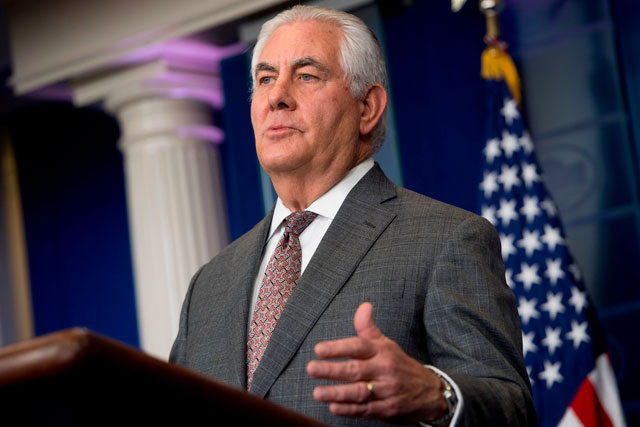
The Secretary of State is in violation of US law, according to a “dissent” memo published by department employees first reported by Reuters.
Officials at the State Department accused Rex Tillerson of breaking the Child Soldiers Prevention Act (CSPA), which prohibits aid and military assistance to nations that conscript troops younger than 18 years old.
In June, Tillerson removed Afghanistan, Iraq, and Myanmar from the list of offending nations, overruling recommendations from career diplomats who cited evidence that each country still employs child soldiers.
A July 28 memo was published by department officials in response to Tillerson’s decision. The document was submitted through the State Department’s “Dissent Channel,” which allows employees to lodge policy disagreements without fear of retribution.
The dissenting officials argued that the de-listing of offending countries “is inconsistent with US law,” “compromises US credibility,” and “undermines the department’s work and harms children.”
“It has risked sending a message to the authorities in all three countries—and to the international community—that minimal efforts are enough,” the memo adds.
It goes on to state that the Secretary of State’s actions convey “that we as a government are not interested in upholding international norms, nor in holding countries accountable for ongoing abuses against children; and that we are willing to neglect the legal foundation and principles guiding our advocacy and diplomacy.”
Tillerson responded to the dissent, by attempting to distinguish Afghanistan, Iraq, and Myanmar from other offending nations that were “making little or no effort to correct their child soldier violations.” He claimed the trio was instead “making sincere — if as yet incomplete — efforts.”
Countries still remaining of the CSPA list include the Democratic Republic of Congo, Mali, Nigeria, Somalia, Sudan, South Sudan, Syria, and Yemen.
President Obama also selectively enforced the law, which was codified in 2008. He routinely issued waivers to Iraq and Myanmar, exempting them from the law’s restrictions.
Tillerson, however, de-listed the countries without offering a waiver.
The dissenting officials warned that a “broad range of State Department reports and analyses” could be weakened due to the selective enforcement of the CSPA.
A separate critical department product, however, the Trafficking in Persons (TIP) report, was already facing credibility questions.
A 2015 Reuters expose found that career officials at State were overruled by Obama administration political appointees over which countries should be included in the list of human trafficking worst offenders.
In that case, Malaysia was given a pass in the 2015 TIP report so that it could later be considered for entry into the Trans Pacific Partnership—the sweeping trade deal, which was a top priority for the Obama White House at the time.